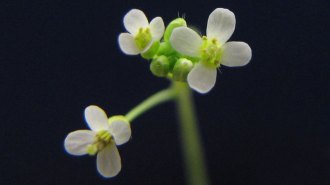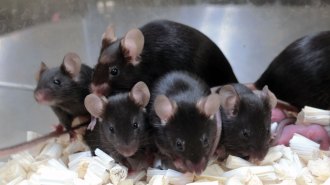All Stories
-
 Astronomy
AstronomyDust and a cold spell on Betelgeuse could explain why the giant star dimmed
Scientists had two options to explain Betelgeuse’s weird behavior in late 2019. They chose both.
-
 Science & Society
Science & SocietyMoral judgments about an activity’s COVID-19 risk can lead people astray
People use values and beliefs as a shortcut to determine how risky an activity is during the pandemic. Those biases can lead people astray.
By Sujata Gupta -
 Chemistry
ChemistryMany cosmetics contain hidden, potentially dangerous ‘forever chemicals’
Scientists found signs of long-lasting PFAS compounds in about half of tested makeup products, especially waterproof mascaras and lipsticks.
-
 Plants
PlantsA widely studied lab plant has revealed a previously unknown organ
A cantilever-like plant part long evaded researchers’ notice in widely studied Arabidopsis thaliana, grown in hundreds of labs worldwide.
-
 Ecosystems
EcosystemsAs ‘phantom rivers’ roar, birds and bats change their hunting habits
A massive experiment in the Idaho wilderness shows it’s not just human-made noises that impact ecosystems. Natural noises can too.
By Nikk Ogasa -
 Paleontology
PaleontologyAn ancient creature thought to be a teeny dinosaur turns out to be a lizard
CT scans of hummingbird-sized specimens trapped in amber reveal that the 99-million-year-old fossils have a number of lizardlike features.
-
 Physics
PhysicsGravitational waves confirm a black hole law predicted by Stephen Hawking
The first black hole merger detected by LIGO affirms that the surface area of a black hole can increase over time, but not decrease.
-
 Space
SpaceMost planets on tilted orbits pass over the poles of their suns
Nearly all of the worlds on misaligned trajectories in other solar systems orbit at nearly 90 degrees to their stars’ equators.
By Ken Croswell -

-

How test tube babies went mainstream
Editor in chief Nancy Shute discusses the history of assisted reproductive technologies, which has made parenthood possible for millions of people.
By Nancy Shute -
 Animals
AnimalsMouse sperm thrived despite six years of exposure to space radiation
A space station experiment suggests future deep-space explorers don’t need to worry about passing the effects of space radiation on to their children.
-
 Health & Medicine
Health & MedicineHere’s what you should know about COVID-19 vaccine booster shots
No one knows if coronavirus booster shots will be necessary. But researchers are working on figuring that out.